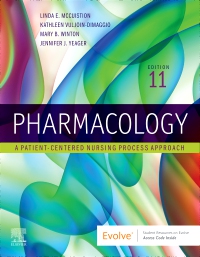
Pharmacology - Elsevier eBook on VitalSource, 11th Edition
Elsevier eBook on VitalSource

Now $100.69
**Selected for Doody’s Core Titles® 2024 in Pharmacology**
Gain a solid understanding of pharmacology and make it a part of patient-centered nursing care! Pharmacology: A Patient-Centered Nursing Process Approach, 11th Edition makes it easy to learn the principles of pharmacology and drug dosage calculation. A clear guide to pharmacotherapy and safe drug administration, this book uses drug prototypes to provide need-to-know information about key drugs, including dosage, side effects, interactions, and more. Nursing Process summaries enhance your skills in clinical judgment and patient care. Written by a team of nursing experts led by Linda McCuistion, this text provides the pharmacology knowledge you need to succeed on the NCLEX® and as a professional nurse.
Newer Edition Available
-
- UNIQUE! Prototype Drug charts provide easy access to key information for representative drugs, including dosages, side effects, interactions, contraindications, pharmacokinetics, and more
- UNIQUE! Extensive Drug Calculations chapter features a math review as well as step-by-step instructions for frequently used methods of dosage calculation
- UNIQUE! Nursing Process summaries highlight important nursing considerations related to drug therapy and emphasize patient teaching, patient safety, and relevant cultural content
- Critical Thinking case studies challenge you to apply your knowledge and analytical skills to realistic patient scenarios, and include answer guidelines on Evolve
- Learning features include chapter outlines and objectives, review questions, and learning resources on the Evolve website
- Application-level NCLEX® study questions include at least one alternate-style question per chapter, preparing you for the growing pharmacology coverage on the NCLEX Examination
- Safety and Quality chapter discusses medication errors, specific nursing measures to promote safety, National Patient Safety Goals, and other safety issues and concerns
- Prioritization coverage helps you learn to prioritize nursing care by listing nursing interventions in the order of priority, and a smaller font size differentiates between need-to-know and nice-to-know content
-
- NEW! Next Generation NCLEX® (NGN) examination-style case studies familiarize you to the way that content will be tested in the new NGN exam
- NEW! Updated and clinically relevant drug content includes the latest drugs and drug therapies, and removes drugs no longer being used
- NEW! Updated Nursing Process summary boxes in each chapter include the Clinical Judgment Model steps along with the nursing process
-
Unit 1: Introduction to Pharmacology
1. The Nursing Process and Patient-Centered Care
2. Drug Development and Ethical Considerations
3. Pharmacokinetics and Pharmacodynamics
4. Pharmacogenetics
5. Complementary and Alternative Therapies
6. Pediatric Considerations
7. Geriatric Considerations
8. Drugs in Substance Use Disorder
Unit 2: Pharmacotherapy and Drug Administration
9. Safety and Quality
10. Drug Administration
11. Drug Calculations
Unit 3: Maintenance of Homeostasis
12. Fluid Volume and Electrolytes
13. Vitamin and Mineral Replacement
14. Nutritional Support
Unit 4: Autonomic Nervous System Drugs
15. Adrenergic Agonists and Antagonists
16. Cholinergic Agonists and Antagonists
Unit 5: Central and Peripheral Nervous System Drugs
17. Stimulants
18. Depressants
19. Antiseizure Drugs
20. Drugs for Parkinsonism and Alzheimer’s Disease
21. Drugs for Neuromuscular Disorders and Muscle Spasms
Unit 6: Mental and Behavioral Health Drugs
22. Antipsychotics and Anxiolytics
23. Antidepressants and Mood Stabilizers
Unit 7: Pain and Inflammation Management Drugs
24. Antiinflammatories
25. Analgesics
Unit 8: Antimicrobial Drugs
26. Antibacterials
27. Antituberculars, Antifungals, and Antivirals
28. Antimalarials, Anthelmintics, and Peptides
Unit 9: Immunologic Drugs
29. HIV- and AIDS-Related Drugs
30. Transplant Drugs
31. Vaccines
Unit 10: Antineoplastics and Biologic Response Modifiers
32. Anticancer Drugs
33. Targeted Therapies to Treat Cancer
34. Biologic Response Modifiers
Unit 11: Respiratory Drugs
35. Upper Respiratory Disorders
36. Lower Respiratory Disorders
Unit 12: Cardiovascular Drugs
37. Cardiac Glycosides, Antianginals, and Antidysrhythmics
38. Diuretics
39. Antihypertensives
40. Anticoagulants, Antiplatelets, and Thrombolytics
41. Antihyperlipidemics and Drugs to Improve Peripheral Blood Flow
Unit 13: Gastrointestinal Drugs
42. Gastrointestinal Tract Disorders
43. Antiulcer Drugs
Unit 14: Eye, Ear, and Skin Drugs
44. Eye and Ear Disorders
45. Dermatologic Disorders
Unit 15: Endocrine Drugs
46. Pituitary, Thyroid, Parathyroid, and Adrenal Disorders
47. Antidiabetics
Unit 16: Renal and Urologic Drugs
48. Urinary Disorders
Unit 17: Reproductive and Gender-Related Drugs
49. Pregnancy and Preterm Labor
50. Labor, Delivery, and Postpartum
51. Neonatal and Newborn
52. Reproductive Health
53. Men’s Health and Reproductive Disorders
54. Sexually Transmitted Infections
Unit 18: Sexually Transmitted Infections
55. Adult and Pediatric Emergency Drugs







 as described in our
as described in our 